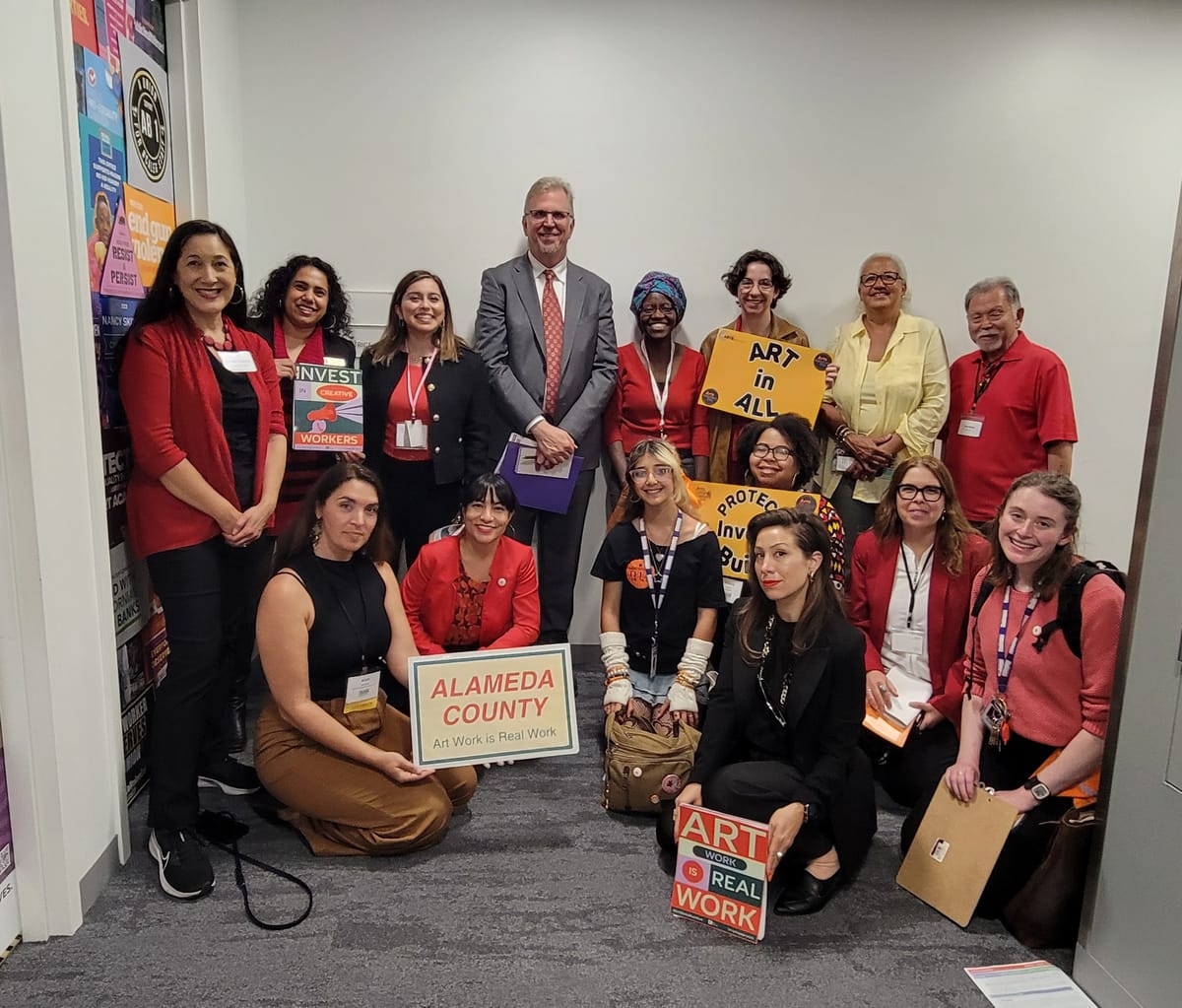Generative AI: Accelerating (Not Mitigating) Climate Change
ARE joined hundreds of other arts advocacy groups and arts advocates in Sacramento with a resounding message that #ArtWorkisRealWork!

One of ARE’s top-performing social media posts was this brief article about the impact of generative AI on the environment. Here it is (below):
Happy Earth Day! Do you consider yourself an environmentalist? If so, I hope you will consider how at odds with the fight against climate change current generative AI models are in terms of the amount of resources that are required to:
(1) create gen AI models (to manufacture chips and train the models);
(2) maintain data centers; and
(3) power AI generations (searches and outputting text, images, audio, or video).
According to Sasha Luccioni of Hugging Face (yes, an AI company), “. . . switching from a nongenerative, good old-fashioned quote-unquote AI approach to a generative one can use 30 to 40 times more energy for the exact same task."
Moreover:
"Training AI models consumes energy. Essentially you’re taking whatever data you want to train your model on and running it through your model like thousands of times. It’s going to be something like a thousand chips running for a thousand hours. Every generation of GPUs — the specialized chips for training AI models — tends to consume more energy than the previous generation.
They’re more powerful, but they’re also more energy intensive. And people are using more and more of them because they want to train bigger and bigger AI models."
Luccioni recommends “digital sobriety” and considering whether you really need to be using generative AI for certain tasks. I would go further and say we should all have a no-AI default.
Of course, all of this could have been avoided if generative AI developers had actually prioritized and focused on solving the world’s major problems, such as climate change, as we’ve so often been told they will. But it’s clear that was never the real mission. Instead, many use AI as a slot machine to churn out derivative art, clutter the web, and edge out the same artists who’ve been exploited to train generative AI, all while also destroying the environment (doing the opposite of what we were told generative AI would do). So far, on a macro level, “generative" AI seems more destructive than generative.
So ask yourself the following:
(1) Can I do this without generative AI?
(2) What are the long-term impacts of frequent use of generative AI on the environment, on my skill set and skills development, and on communities I care about?
(3) In the long term, is it better for me, for society, and for the planet if I do not rely on machines to do this?
In short, given the ways in which generative AI exploits human beings and our environment—treating both as extractive resources—make no AI your default.
April was full of other behind-the-scenes work.
Here’s an update on some of what Artists Resisting Exploitation worked on in April:
In addition to forging connections with other arts advocates at CA for the Arts’ Summit on April 16, ARE participated in CA Arts Advocates’ Advocacy Day the next day. ARE joined hundreds of other arts advocacy groups and arts advocates in Sacramento with a resounding message that #ArtWorkisRealWork! On April 17, ARE met with the offices of California assemblymembers and state senators. In each of my meetings (with staffers for five assemblymembers and two state senators in total), I shared with our elected officials how generative AI has impacted me and fellow creatives, highlighting (1) the massive layoffs writers, editors, illustrators, animators, actors, and other creative workers have endured and (2) the fact that Big Tech corporations steal our copyrighted work to train generative AI models that are then used to compete directly with us—that they effectively use our own work against us.
As I mentioned to another advocate, attending this event and CA for the Arts’ Summit the day before was one of the rare times in my life when I was certain I was exactly where I should be. I met so many amazing and kind diehard art lovers that I am extra pumped to level up our fight.
I hope you, too, will contact your elected officials to let them know how you and/or your family members, friends, neighbors, or colleagues who are artists are being impacted by the widespread and unregulated data theft AI companies are engaged in. If you’re in California (the belly of the beast), CA Arts Advocates offers this link to help you find and contact your legislators:
https://www.caartsadvocates.org/find-your-legislator
Contact your elected officials today and in the future (for as long as our fight must continue)!
